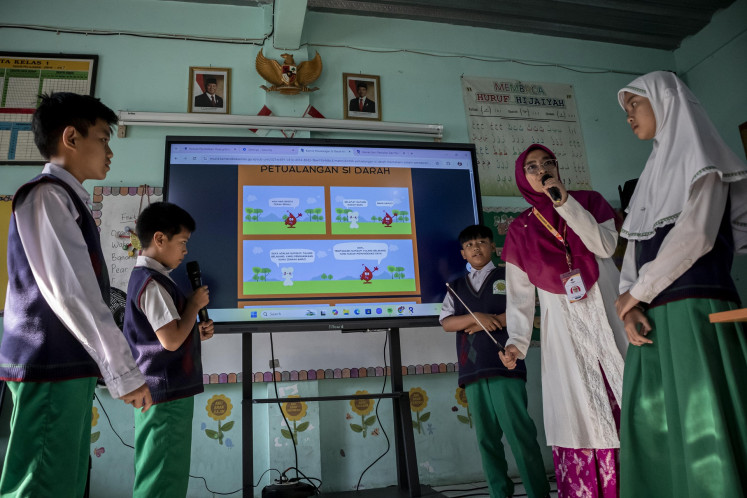Energy and mining revenue expected to drop in 2010
The failure to attract enough investors for new oil and gas blocks offered in 2009 will cost the government a Rp 60 trillion (US$6
Change text size
Gift Premium Articles
to Anyone

T
he failure to attract enough investors for new oil and gas blocks offered in 2009 will cost the government a Rp 60 trillion (US$6.36 billion) drop in state revenue this year, the energy and mineral resources ministry said.
The ministry estimated the revenue from the sector would drop to Rp 175.48 trillion in 2010 or down by about 25 percent from Rp 235.31 trillion in 2009, as a direct result of a new regulation on cost recovery.
Waryono Karno, secretary general at the Energy and Mineral Resources Ministry, said the failure to find investors to develop most of the oil and gas blocks in 2009 was the main factor contributing to the decrease.
“This will directly affect revenue because the government normally receives signing bonuses from every block after it is purchased by an investor,” Waryono said when the ministry presented its annual year report on Thursday.
The oil and gas industry has been the backbone of the country’s economy, contributing more than 30 percent to total state revenue.
Of the total Rp 235 trillion revenue estimated to be derived from the energy and mining sector in 2009, oil and gas contributed as much as Rp 182.63 trillion.
The government offered 40 oil and gas blocks from December 2008 to November 2009, but only eight blocks attracted investors.
The declining trend of investment in oil and gas was also visible through the pattern of investment throughout 2009.
The ministry revealed that investment generated $12.18 billion, lower than the 2009 investment target of $13.77 billion and the 2008 investment total of $13.52 billion.
The ministry has repeatedly said the lower investment was caused by the government regulation capping cost recovery payment.
The cost recovery is part of the production sharing contract (PSC) scheme adopted by Indonesia’s oil and gas industry. Under the cost recovery mechanism, the government reimburses all contractor spending once it has entered the production stage. In the past, all expenses were covered under the scheme. But as of last year, expenses have been capped annually by the law on the state budget.
For this year, the government and the House have agreed to cap cost recovery at $12 billion, up from $11.05 billion in 2009.
Budi Basuki, president director of Medco E&P Indonesia, said the cost recovery capping was disturbing for oil and gas contractors.
“This has put us out of focus because we must allocate extra resources to deal with the issue. The policy is also weird, because the cost recovery payment is actually not the government’s money, but now this is regulated in the state budget,” he said.
PT Chevron Pacific Indonesia president director Suwito Anggoro said the government should consider offering other alternatives to oil and gas contracts.
“If Indonesia’s oil and gas industry is a restaurant, maybe this is the right time to offer menus other than the PSC,” he said.
But, Andang Bachtiar, a head of the advisory board at the Indonesian Geologist Association (IAGI) said the failure to attract investors might also be due to the quality of exploration data provided by the government in the oil and gas block tenders.
“By far, the budget allocation to provide exploration data is very limited. We simply expect the contractors to take higher risks at this stage,” he said.
The government said it would conduct a comprehensive evaluation to solve the matter.









